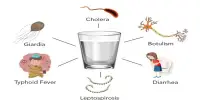Prostate cancer is a serious health problem for which there is now no viable treatment once it has progressed to the advanced, metastatic stage. It is the second most frequent cancer in males (after skin cancer), yet it is usually treatable.
By breaking out from a prostate tumor, prostate cancer cells can spread. They can migrate to other parts of the body via blood arteries or lymph nodes. Cancer cells that have traveled to other tissues may attach and develop to form new tumors, causing damage wherever they fall.
A new study supports a new clinical trial by revealing a crucial biological pathway that contributes to aggressive prostate cancer. The findings were published in Clinical Cancer Research.
The study focused on an enzyme called DNA-PK (DNA-dependent protein kinase), which is a key component of the cellular machinery that controls both DNA repair and gene expression. Researchers at the Sidney Kimmel Cancer Center Jefferson Health (SKCC) and their collaborators at Memorial Sloan Kettering Cancer Center, the University of California, San Francisco, and Celgene Corporation led it.
Karen E. Knudsen, PhD, EVP of Oncology Services and Enterprise Director of SKCC, directed the research. Previous research has found that DNA-PK is overactive in metastatic prostate cancer and that this hyperactivity is linked to a poor prognosis in patients with prostate cancer.
“Our study further elucidates the functions of DNA-PK and identifies this protein as a master regulator of gene networks that promote aggressive cancer behaviors,” says lead author Emanuela Dylgjeri.
It is our hope to use the information gained by these studies to understand which prostate cancer patients might benefit the most from combination treatments with a DNA-PK inhibitor drug.
Dr. Karen Knudsen
DNA-PK was found as the most significantly linked kinase with metastatic disease progression in a companion study in the same issue led by Felix Feng’s team in partnership with the Kundsen lab.
The researchers discovered that DNA-PK modulates the expression of gene networks controlling a variety of important cancer-related cellular events, including the epithelial-mesenchymal transition, the immune response, metabolic pathways (Dylgjeri et al.), and Wnt signaling (Kothari et al.), in order to better understand how DNA-PK causes poor outcomes.
Targeting DNA-PK, according to the current findings, could lead to the development of effective ways to prevent or treat aggressive, late-stage prostate cancer. The findings were used to create a clinical trial that combined standard-of-care with a first-in-man DNA-PK inhibitor.
The trial’s early results are promising, and the researchers have shown in a lab environment that the combination strategy is more successful than either solo treatment at eliciting anti-tumor effects. The clinical trial is still ongoing, and it has now progressed to the expansion phase.
The newly published studies are aimed at bringing basic scientific findings from the lab to the clinic, but the researchers also intend to apply what they’ve learned in the clinic to the lab.
The clinical trial’s findings will provide vital information and raise new concerns that will help researchers design further trials with the ultimate objective of figuring out how DNA-PK regulates certain cellular pathways to promote more aggressive cancer activity.
These investigations will help researchers create more accurate genetic tests to diagnose advanced prostate cancer, determine the best treatment for individual patients, and predict treatment outcomes.
Team leader Dr. Karen Knudsen envisions long-term practical outcomes of this research, saying, “it is our hope to use the information gained by these studies to understand which prostate cancer patients might benefit the most from combination treatments with a DNA-PK inhibitor drug.”
















